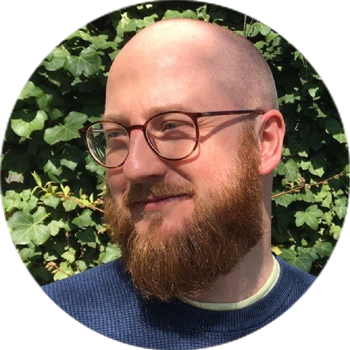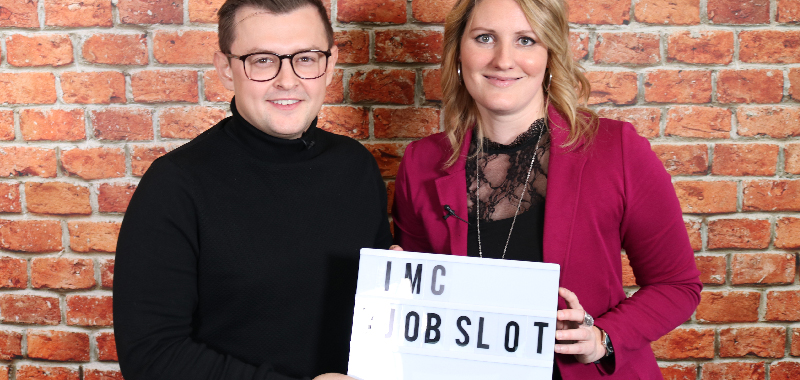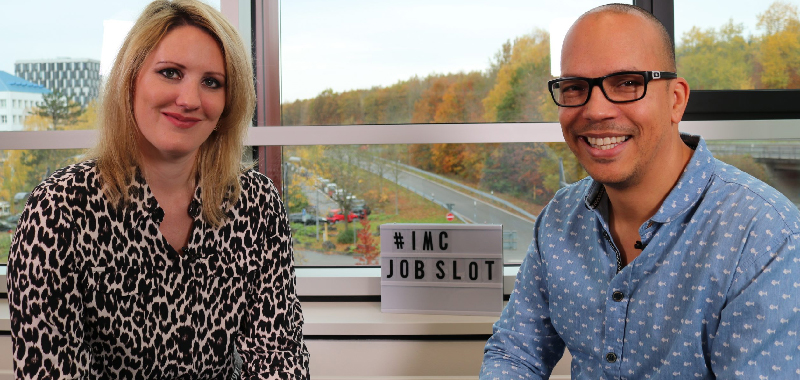
Career hoppers welcome!
a concept designer
“Two thirds of you will at some point work in a job that you currently don’t even know exists.” This statement by his former German studies professor hit the nail on the head for Philipp Schossau. After graduation, he applied for a position as a concept designer with an e-learning provider.
Today, his awesome job title at imc is Instructional Designer. However, that didn’t really change his role. In this interview, he reveals what exactly his job entails, the skills it calls for and why he considers it a privilege.

Job | Concept/ Instructional Designer
Works in | Essen, Germany
At imc since | 2016
Superpower | flexibility to adapt quickly to new projects
Favourite food | Palak Tofu
Hello Philipp! Thanks for making time! It's safe to say your job title Instructional Designer can be a little confusing. Can you explain what that is all about?
Back when I applied for the role after my German philology and history studies, it was called concept designer. I believe that was a bit more obvious. Really, editor for digital training would be the most helpful job description. In other words, I develop the learning concept for our clients.
How would you explain what you do to your grand parents?
That's not quite as straightforward. There have been a few misunderstandings in my family over the years. I've often been described as someone who writes operating instructions for Volkswagen, or plain and simple "Philipp works in advertising".
Today I say: I create professional development for large companies, just from my PC.
What does your typical day at work look like?
When I'm in the office, I start by checking my emails. Then, I prioritise and schedule the tasks at hand and check the status of my projects. For example, I might be working on a script or coordinate with other teams or the client.
Generally speaking, there's always a good mix of extensive communication and creative work. I like this change between active talk and interaction and the extremely quiet phases, where I'm totally focused and block out everything else.
You stated earlier that you are the person who develops learning concepts for clients.
Can you explain that in a little more detail?
Once a contract has been concluded, a colleague from Sales, the competent project manager and myself typically have an initial meeting with the client. We outline the scope of the project and I double-check what exactly the client wants - or what they think they need.
I need to understand very quickly what expectations they hold and what exactly the employees are ultimately meant to learn. Based on this, I advise the client and we sit down together to define the type of training we want to develop.
The next phase is the concept stage with a rough and detailed concept. Once the detailed concept has been approved, it is handed over to the programmers and designers. Again, I'm involved in the coordination, and I test the Beta version before we submit it to the client.
What is more difficult in the concept development: If the client has no idea what they want, or if they have very specific expectations?
Neither is easy. Both require immense tact and instinct. When a client has no idea at all and is totally happy with all your suggestions to the point where they can't make a decision, you ultimately need to make the decision for them as a concept designer and hope that it really is a good fit. Meanwhile, it might not be possible to realise that very clear vision some clients have, or to align it with the actual training goals.
I often have to educate my clients, as many cannot judge the time and cost investments involved - for example, for some animations. Some expect teasers in blockbuster quality for next to nothing within a week. Of course, that's unrealistic. It takes a good bit of diplomacy and explanation.
Now, I would say, the most crucial aspect is found elsewhere: It's really important to start by defining and clarifying all the terms. Say, gamification: everyone has a different understanding of what that means. I need to get people on board from where they are. The best way to achieve that is to use specific examples and results from our portfolio. Overall, client consultation can sometimes be a balancing act.
I need to decide what to advise the client on, when to talk them out of an unrealistic idea, and when to respect their wishes. Thankfully, I have learned a lot in my nine years on the job.
What do you appreciate the most about your job?
Without a doubt, the variety. I deal with such an extensive range of people, industries and topics, and really like the project business. Maybe it sounds a bit cheesy, but I work in a job where I learn something every day. I consider that a great privilege.
What did you want to be as a kid and why?
I think I wanted to become a diver at some point. I really don't know why though. I guess it looked pretty cool with the wetsuits and such...
How important is professional development to you personally? What do you do in that regard?
In the project business, personal development can be difficult. Of course, there's the big professional development (CPD) courses - I qualified as a certified face-to-face trainer last year.
Mostly though, I do many micro courses. I always keep an eye on what others in my field are doing, and try to learn from that to develop myself.
What your favourite way to start your day?
I just love being woken up by my kids!
Thank you very much and I hope you'll keep having diverse interesting projects!

Team members who support each other and celebrate successes together: That is very important for Sales Consultant Vildan from Switzerland.
More about how he came to sales and how he spends his free time in the interview.

"There are certain skills you should have for my job - and then there is what I bring on the table". In the video interview of the job slot, Project Management Officer Kenny tells what he has learned himself during his career and what role his team plays for him.
Would you like to know more about imc as an employer? Then take a look at our career section, maybe there is a suitable position for you.
We are also always happy to receive unsolicited applications!